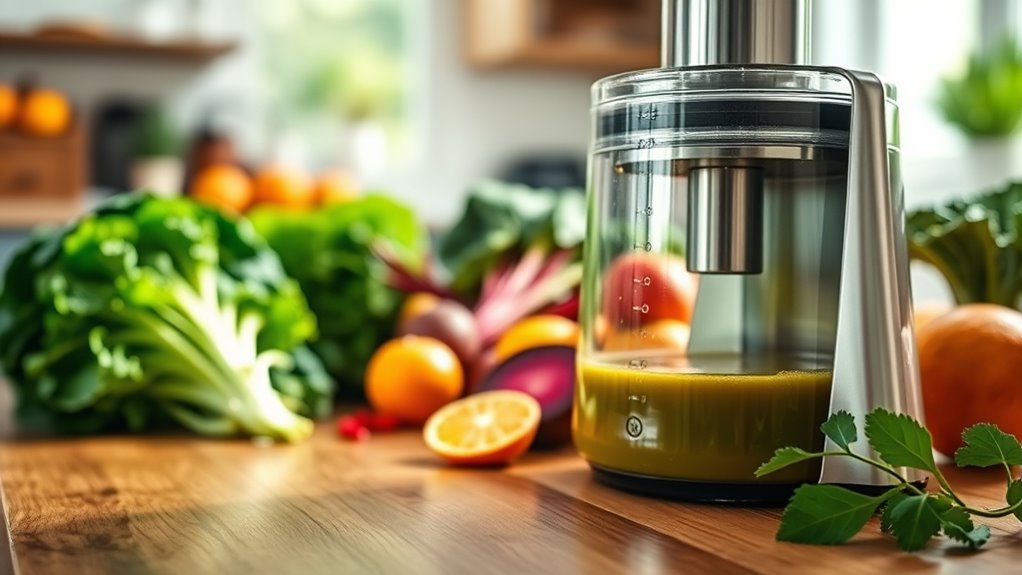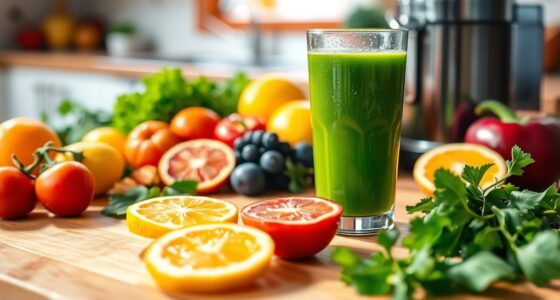Juicing can offer benefits for your kidney health, like increased hydration and essential vitamins, but it’s not all good news. Drinking excessive amounts of high-oxalate juices, like those made from spinach, could lead to kidney damage. Moderation is key, and it’s crucial to consult your healthcare provider before starting a juicing regimen. Choosing low-mineral fruits and veggies guarantees safety. If you’re curious about which juices might best support your kidney health, there’s more to discover.
Key Takeaways
- Juicing can support kidney health by providing essential nutrients and hydration, but moderation is crucial to avoid potential risks.
- High-oxalate juices, like those from spinach and beets, can cause severe kidney damage; moderation is key.
- Consult a healthcare professional before starting a juicing regimen, especially for individuals with kidney concerns.
- Limit juice intake to 8-12 ounces per day and choose low-mineral fruits and vegetables to prevent nutrient imbalances.
- Incorporating antioxidant-rich juices, like cranberry and blueberry, may help reduce inflammation and support kidney function.
Juicing Benefits for Kidney Health
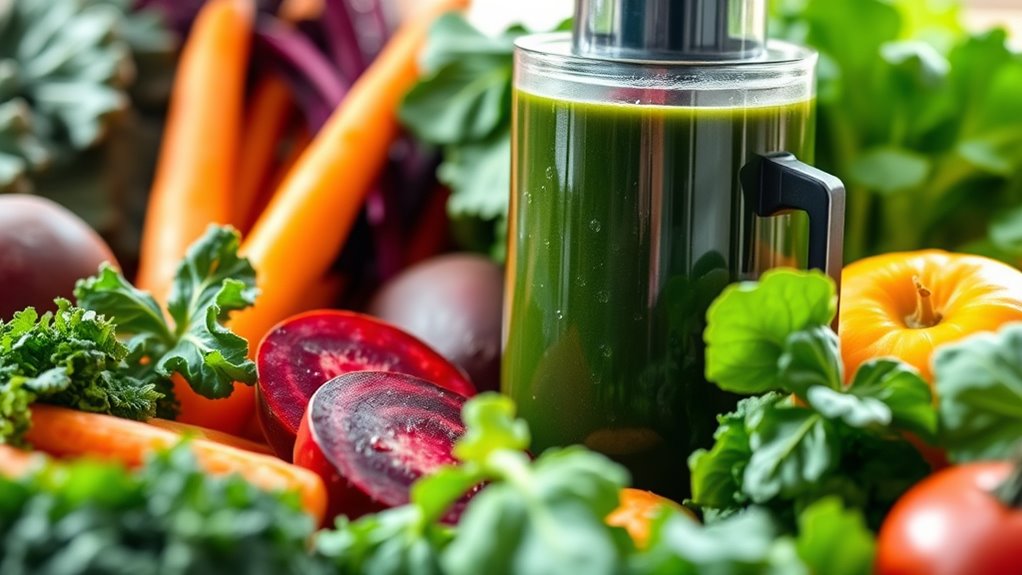
When you’re looking to boost your kidney health, juicing can be a game-changer. It provides essential vitamins and minerals without the heaviness of whole foods, making it easier to meet your daily dietary recommendations.
Moderate vegetable juice consumption has been linked to a slower decline in kidney function, especially for young, healthy individuals. Juices like cranberry and blueberry are packed with antioxidants that help reduce inflammation and protect your kidneys from oxidative stress.
Moderate vegetable juice intake may help slow kidney function decline, particularly in healthy young individuals, thanks to antioxidants in juices like cranberry and blueberry.
Plus, increased fluid intake from juicing promotes hydration, vital for peak kidney function. If you’re dealing with kidney disease, juicing can also offer concentrated sources of vitamins like B6 and folic acid, further supporting your kidney health.
Embrace the juicing benefits for a healthier you!
Nutritional Considerations of Juicing
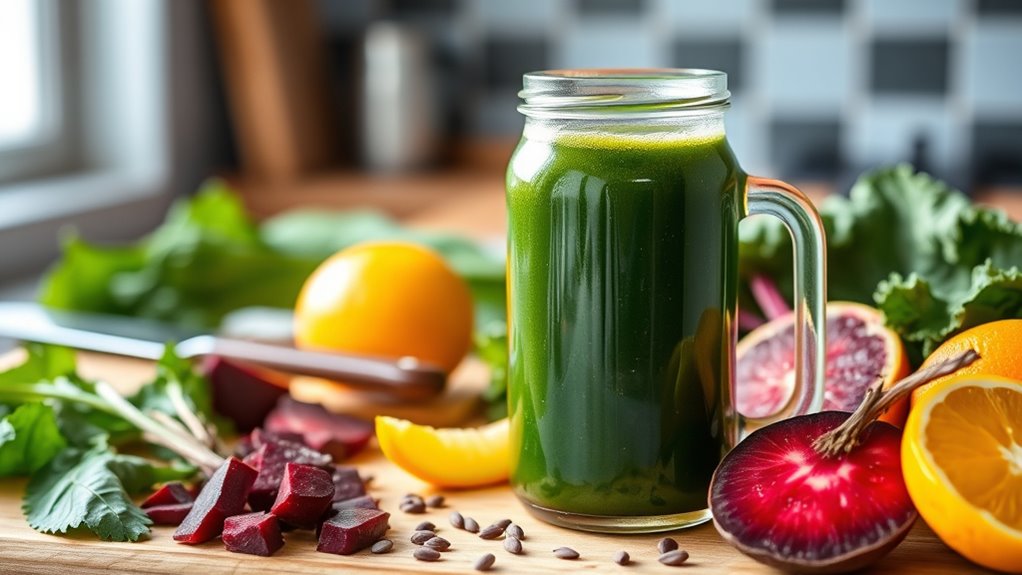
While juicing offers many benefits for kidney health, it’s important to reflect on its nutritional implications. Juice consumption can lead to higher sugar intake and loss of dietary fiber, which is critical for managing hunger and digestion. It’s significant to evaluate the balance of nutrients in your diet; juicing shouldn’t replace all meals long-term. Additionally, enjoy the act of eating, as juicing can diminish that satisfaction. For those with kidney concerns, monitoring potassium and sodium levels in juices is crucial, as certain fruits and vegetables can exacerbate health issues.
| Nutritional Aspect | Whole Fruits & Vegetables | Juices |
|---|---|---|
| Fiber | High | Low |
| Sugar Content | Lower | Higher |
| Meal Replacement | Balanced | Lacks balance |
Risks of Extreme Juicing
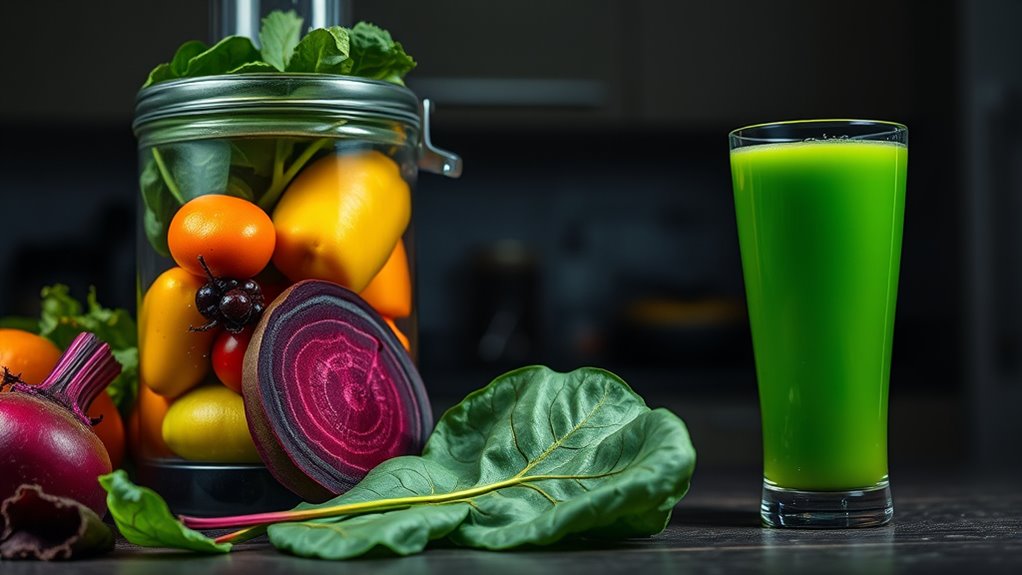
Extreme juicing can pose serious risks to your kidney health, particularly if you’re consuming high-oxalate juice blends. Here are some key risks to take into account:
- Kidney Injury: Excessive intake of high-oxalate juices can lead to severe kidney damage.
- Oxalate Nephropathy: Some individuals have developed this condition after consuming large amounts of juices with spinach and beets.
- Elevated Oxalate Levels: High-oxalate juice combinations can greatly raise oxalate levels in your body, affecting kidney function.
- Age-Related Risks: Cases like those of a 68-year-old and an 81-year-old man highlight the dangers of extreme juicing linked to high-oxalate diets.
Moderation is essential; occasional juicing is safe, but excessive consumption can lead to serious health issues.
Understanding Oxalates and Their Impact
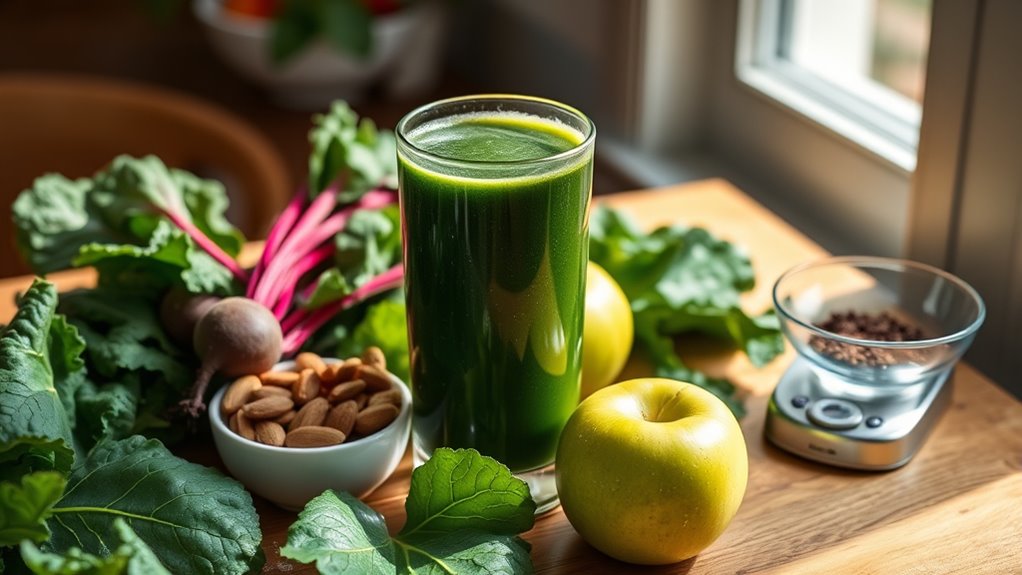
When you juice, it’s essential to know about oxalates and the foods that contain them.
Leafy greens like spinach and certain fruits can pack a high oxalate punch, which might pose health risks, especially for your kidneys.
Understanding these sources can help you make better choices for your juicing routine.
Oxalate Sources Explained
Understanding oxalates is vital for maintaining kidney health, especially if you’re considering juicing. These naturally occurring compounds, found mainly in leafy greens, can pose risks when consumed excessively.
Here are some high-oxalate foods to be aware of:
- Spinach
- Beets
- Rhubarb
- Strawberries
While these foods offer health benefits, aggressive juicing can lead to kidney injury known as oxalate nephropathy. The risk increases with large quantities of high-oxalate vegetables like spinach and Swiss chard.
It’s important to enjoy these foods in moderation, as many people can safely include them in their diets without adverse effects. Incorporating omega-3 sources like chia seeds can provide nutritional benefits without the risks associated with high-oxalate foods.
Keep your kidney health a priority by being mindful of your oxalate intake!
Health Risks Overview
While enjoying the benefits of juicing, it’s vital to be aware of the potential health risks associated with high oxalate intake.
Oxalates, found in foods like spinach and beets, can cause kidney injury when consumed in excessive amounts. High juice intake of oxalate-rich ingredients may lead to oxalate nephropathy, damaging your kidney function.
For instance, a 68-year-old man experienced severe kidney injury after following a juice diet high in spinach and Swiss chard. The risk of kidney injury increases considerably with excessive oxalate consumption, particularly for those with pre-existing kidney conditions.
Safe Juicing Practices for Kidney Patients

Before diving into a juicing regimen, kidney patients must consult a healthcare professional to evaluate their specific health needs.
Here are some safe juicing practices to keep in mind:
- Monitor potassium and sodium levels: Choose fruits and vegetable juices low in these minerals to avoid complications.
- Limit intake: Stick to 8 to 12 ounces per day to prevent excessive sugar and nutrient imbalances.
- Avoid high-oxalate ingredients: Ingredients like spinach and beets can pose risks; opt for safer choices like cucumber and celery.
- Incorporate dietary fiber: Using the pulp from fruits and vegetables retains beneficial fiber, supporting your digestive health.
Juices That Promote Kidney Health and Detoxification
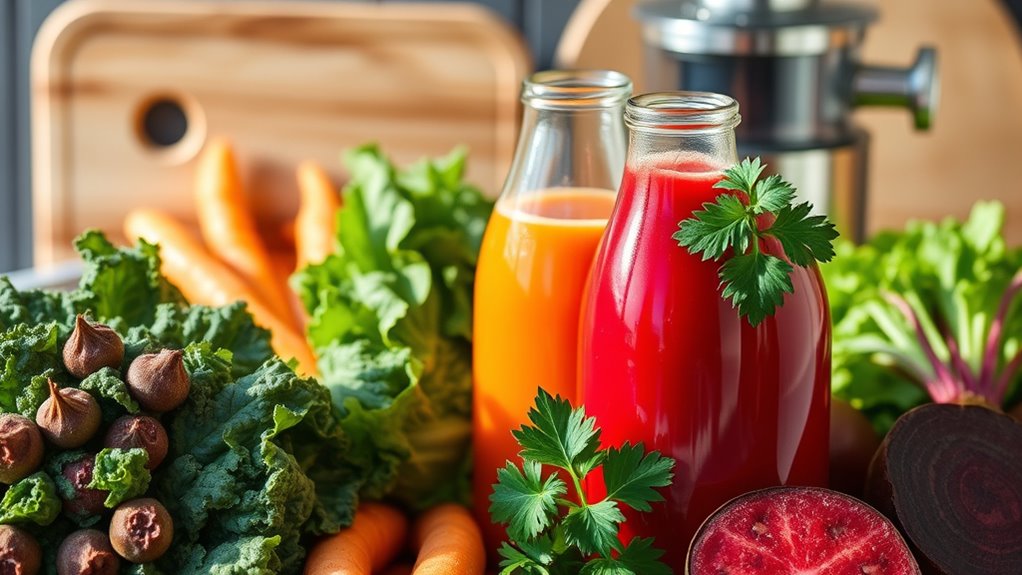
When it comes to juicing for kidney health, choosing the right ingredients is key. Nutrient-rich juices packed with antioxidants can help reduce inflammation and support kidney function. Staying hydrated with juices like cucumber and spinach also plays an essential role in maintaining overall kidney health. Additionally, incorporating juices high in vitamins A, C, and K can further enhance immune health and promote detoxification.
Nutrient-Rich Juice Ingredients
Juicing with nutrient-rich ingredients can greatly enhance kidney health and promote detoxification. By incorporating specific ingredients into your detox juice, you can harness their powerful benefits.
Here are four key nutrient-dense ingredients to take into account:
- Cranberries – Packed with antioxidants that protect and reduce inflammation, essential for kidney health.
- Beets – Known for their high nitrate content, they improve blood flow and aid in reducing inflammation.
- Spinach – Provides essential vitamins and minerals but should be consumed in moderation due to high potassium levels.
- Ginger – Offers anti-inflammatory properties, making it a fantastic addition to your juicing routine.
Including these ingredients can greatly support your kidneys and enhance detoxification efforts. Additionally, it is crucial to maintain portion control when consuming juices to avoid excessive calorie intake.
Hydration and Kidney Function
Maintaining hydration plays an essential role in kidney health, especially when incorporating juices into your diet. Juicing can considerably boost your fluid intake, which is critical for keeping your kidneys hydrated and functioning at their best.
Vegetable juices made from hydrating ingredients like cucumbers and watermelons promote detoxification, helping to flush out toxins. Including antioxidant-rich juices, such as those made from cranberries and blueberries, can further support kidney health by potentially reducing inflammation and preventing urinary tract infections.
Additionally, citrus fruits like lemons infuse your juices with citric acid, which may help prevent kidney stones and enhance function. Prioritizing hydration through juice consumption not only nourishes your body but also guarantees adequate blood flow and nutrient delivery to your kidneys.
Antioxidants and Inflammation Reduction
Incorporating antioxidant-rich juices into your diet can greatly enhance kidney health by combating oxidative stress and reducing inflammation.
Here are four juices you should consider:
- Cranberry Juice: Packed with antioxidants, it protects against oxidative stress and may lower chronic kidney disease risk.
- Beet Juice: Its high nitrate content improves blood flow and helps reduce inflammation, supporting kidney function.
- Citrus Juices: Juices from lemons and oranges contain citric acid, which helps prevent kidney stones by inhibiting calcium crystallization.
- Ginger and Turmeric Juices: Their anti-inflammatory properties enhance detoxification, promoting overall kidney health.
Regularly consuming these vegetable juices can greatly impact your kidney health and well-being.
Expert Insights on Juicing for Kidney Wellness
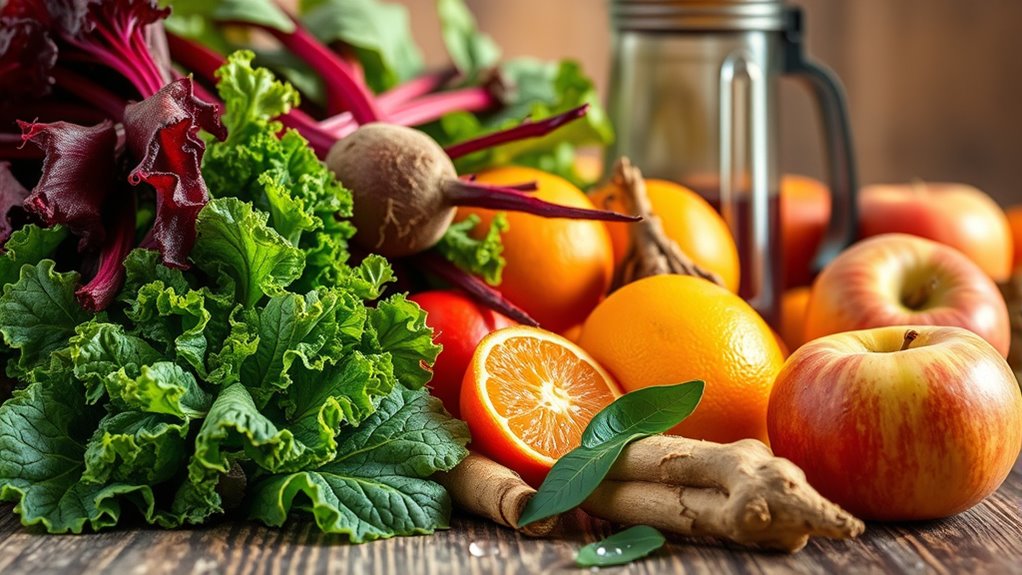
While many people seek natural ways to boost their kidney health, expert insights reveal that juicing can offer significant benefits when done mindfully.
Moderate vegetable juice consumption, particularly from kidney-supportive ingredients like cranberries and blueberries, may help maintain kidney function by providing antioxidants that reduce inflammation.
Moderate consumption of vegetable juices, especially cranberries and blueberries, supports kidney function through antioxidant-rich inflammation reduction.
Research shows that these juices can lead to a smaller decline in eGFR, especially among young, non-obese women with normal blood pressure.
However, it’s important to consult with healthcare providers before incorporating juicing into your diet, especially if you have decreased kidney function, to monitor potassium and sodium levels.
Hydrating fruits and vegetables in your juices can aid detoxification and contribute to your daily fluid intake, essential for ideal kidney health. Additionally, unique homemade fruit juice recipes can provide a variety of nutrients that support overall wellness.
Real-Life Scenarios of Successful Kidney Health Improvement

Many individuals have found success in improving their kidney health through juicing. Here are some inspiring real-life scenarios:
- Emma: Hydrated and reduced kidney stones with a daily Cranberry Blueberry Cleanse, leveraging its antioxidant benefits.
- Jake: Boosted energy and recovery times by consuming Beet Lemon Detox Juice, known for its anti-inflammatory properties.
- Sophia: Enhanced her kidney function with Green Kidney Support Juice, packed with nutrients from spinach and cucumbers.
- Tom: Strengthened his immune system and improved complexion with Aloe Vera Citrus Flush, showcasing its overall health benefits.
These examples illustrate how juices can promote kidney health and detoxification when consumed responsibly, supporting your journey against chronic kidney disease and enhancing overall health. Additionally, incorporating fresh juices made from 12-15 medium oranges can provide a significant nutrient boost that supports kidney function.
Frequently Asked Questions
Is Juicing Safe for the Kidneys?
Juicing can be safe for your kidneys, but it’s essential to approach it carefully.
You need to be mindful of the potassium levels in various juices, especially if you have kidney issues.
While juices can provide vitamins, they often lack fiber, so don’t forget to include whole foods in your diet.
Always consult with a healthcare professional before adding juicing to your routine to guarantee it aligns with your specific health needs.
What Is the Best Drink to Restore Kidney Function?
You might think chugging juice will magically restore your kidney function, but it’s more complicated than that.
While vegetable juices can support your kidneys, the best drink for you depends on your specific needs.
Consider hydrating with water first, then incorporate juices rich in antioxidants, like cranberry or beet juice.
Just remember to watch those potassium and sodium levels, and consult your healthcare provider to find what truly suits your kidney health.
What Damages the Kidneys the Most?
When you think about what damages the kidneys the most, consider excessive sodium intake, high oxalate levels, and dehydration.
Processed foods and certain juices can overload your kidneys with sodium, while consuming too many oxalate-rich foods can contribute to kidney injury.
You should also stay hydrated, as dehydration increases the risk of kidney stones.
Finally, watch your potassium intake, particularly if your kidney function is compromised—too much can lead to serious health issues.
What Juice Is Best to Flush Kidneys?
If you’re on a quest to flush your kidneys like a superhero on a mission, search no more than watermelon juice!
It’s like nature’s ultimate detox potion, packed with hydration that’ll have your kidneys singing.
Add in some lemon juice, and you’ve got a powerhouse duo fighting off kidney stones.
Don’t forget about beet juice, too—it’s a secret weapon for boosting blood flow.
Conclusion
In summary, while juicing can offer some benefits for kidney health, it’s essential to approach it wisely and thoughtfully. Are you ready to make informed choices that truly support your kidneys? Remember, balancing nutrients and understanding your body’s needs is key. By following safe juicing practices and consulting with healthcare professionals, you can enjoy delicious juices while promoting kidney wellness. Take charge of your health journey—you deserve to feel your best!
Cindy thoroughly researches juicing trends, techniques, and recipes to provide readers with practical advice and inspiration. Her writing style is accessible, engaging, and designed to make complex concepts easy to understand. Cindy’s dedication to promoting the advantages of juicing shines through her work, empowering readers to make positive changes in their lives through the simple act of juicing.

